The Poetry Bus Hits Manhattan, Part 4: The Reading Begins
This post originally appeared on BillyBlog on October 12: 2006: I have experienced the Typing Explosion. Around 4:45, they ring some bells, sound some horns and put up a "Union Break" sign over the transparency that listed the rules. I return to my seat. There is much commingling.
I have experienced the Typing Explosion. Around 4:45, they ring some bells, sound some horns and put up a "Union Break" sign over the transparency that listed the rules. I return to my seat. There is much commingling.
At 5:07, John Ashbery arrives. He sits in the row behind me. This is torture for me because I generally frown upon/am reluctant to approaching writers before readings to ask for their signatures. It's almost an unwritten rule, although I have done it before and never been called out on it, but still.
Tonight worries me. I anticipate that many poets, because of the length of the event, will vanish during the reading. I hardly expect someone with the stature of John Ashbery to remain throughout. I have eight items that Ashbery could sign for me, but one in particular is a do-or-die item for me. It is a hardcover first edition of his Selected Poems
By 5:13, the reading hasn't started yet. I am filled with nervous energy as I pull the book out, and head over to Ashbery. I squat next text to him and ask, "Mr. Ashbery, would you be so kind as to sign this for me before the reading starts?" He complied genially. I thanked him and returned to my seat. The aforementioned Brian of Toronto was a tad disappointed that I only brought one thing over to Ashbery (he would have gone for broke), but I hoped to catch him during the first break, and the Selected Poems
The reading kicked off shortly thereafter, as "Day 27 of the Poetry Bus Tour" took off. First, the three ladies of the Typing Explosion read a poem they had composed, donated from one of the audience members. Meanwhile, all the other poems, including "Billy's Blog" had been clipped to a clothes line in the space to the right of the reading. The way they read was fantastic. One Typist faced the microphone and covered her eyes, the poem was held up behind her head and the other two Typists, on either side of the reader, whispered the poem into her ears. She then read the poem filtered in this fashion. It was very cool.
Then, they switched, and the second Typist recited the same poem, in her own translation, with a mock-German accent. And finally, the third Typist did the same, only her poem was sung, a Capella.
Thunderous applause.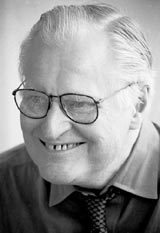 John Ashbery took the stage, acknowledged that it was "a hard act to follow," and then read five poems, many of which would be appearing in an upcoming book, A Worldly Country: New Poems
John Ashbery took the stage, acknowledged that it was "a hard act to follow," and then read five poems, many of which would be appearing in an upcoming book, A Worldly Country: New Poems
The first poem was called "Promenade," pronounced prah-men-odd or prah-men-aid, "I haven't yet decided," he quipped.
Next was "A Litmus Tale," in which he referred to "the dishevelled frankness we all inhabit". Very Ashbery. This was followed by "So Long, Santa," then one called either "Forward," or "Forwarding." He ended with a pantoum (a poetic form detailed here) called "Fantoum." Alas, none of these poems appear to be online anywhere, but I scribbled some lines from "Fantoum": "why his business was for sale," "Nursery of goats," and "purple emu laid another egg." Ashbery was typically complex and brilliantly inaccessible, why people who don't like poetry are reminded why they don't like poetry, and why people who love it, are reminded why Ashbery is the patron saint of difficult verse.
Ashbery was followed by Albert Mobilio, who read "What the Great Ones Do," and "I First Read."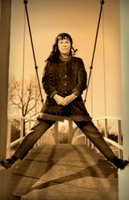
After Mobilio came Mary Jo Bang (right), who read some poems in an alphabetical sequence: "A as in Alice," "B is for Beckon" and "S is for South Park."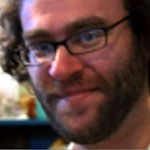 She was followed by Joshua Beckman, who read two untitled poems and a third called "Death Lasts," which included the hilarious line, "I saw the best minds of my generation living in lofts, thinking they were the best minds of my generation."
She was followed by Joshua Beckman, who read two untitled poems and a third called "Death Lasts," which included the hilarious line, "I saw the best minds of my generation living in lofts, thinking they were the best minds of my generation."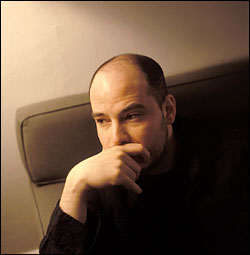
Next up was Timothy Donnelly, who read "A Malady That Took Place of Thinking," "The Last Vibrations," "A Team of Fake Deities Arranged on an Orange Plate," and "The New Intelligence," which is excerpted here on a blog called Cahiers de Corey.
Thomas Sayers Ellis was next to read. He piques some interest at the beginning of his reading by saying that he had never met John Ashbery before and that he had not heard him read before, so that when he refers to Mr. Ashbery in one of his poems, he "does not mean to offend." He read three pieces: "Or," which is in this month's issue of Poetry and can be read here on a blog called The Virtual World. Next, he read "No Easy Task," which the writer Erica Tempesta, in an article in
The Oberlin Review, said questions "the obligation of poets of color to communities of color." It was in this poem that he uttered the line about Ashbery that he alluded to at the beginning of the reading:
"Bling Bling has more imageryIn the same article, she also refers to Ellis' final poem, "All Their Stanzas Look Alike," and how that piece "calls into the spotlight the whiteness of the American literary tradition and wrestles with the idea of where a black man educated in that tradition stands in relation to American poetry and popular culture." I recommend the poem, which can be read here.
than all of Ashbery."
Thomas Sayers Ellis' reading was definitely the most memorable and passionate at this point in the evening.
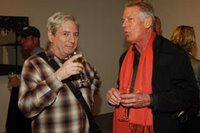 The next poet, Larry Fagin, read some limericks, all untitled. That's him in the plaid shirt (that's critic Bill Berkson in the scarf).
The next poet, Larry Fagin, read some limericks, all untitled. That's him in the plaid shirt (that's critic Bill Berkson in the scarf).Monica Fambrough was next. She read four poems. Two of them, "Pastoral" and "Les Femmes, Les Fleurs," can be read online here. She also read a poem called "Quill," I think, or it might have been "Prell, " here. And then she finished with "Ode to the Good High Schoolers," which you can actually hear her read on a link on the blog Weird Deer, here.
It was during her reading, at 6:10 PM when my heart sank as I looked over my right shoulder and saw John Ashbery slipping out of the room. Well, at least I had one of his books signed, and there was still a lot of poetry to go.

No comments:
Post a Comment